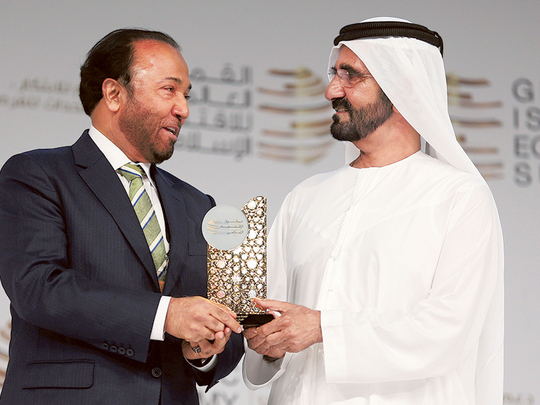
Dubai: The Islamic economy proved its mettle during the global financial crisis, making it a perfect choice for Muslims and non-Muslims alike, said Majid Saif Al Ghurair, Chairman of Dubai Chamber of Commerce and Industry, when sectors of the conventional economy underperformed its counterparts in Islamic economy.
The Islamic economy is a way of life experienced by over 1.6 billion Muslims around the world and its model cuts across all aspects of economic and social lifestyle of individuals and communities, Al Ghurair said.
The summit witnessed discussions around the relevance of Islamic economy sectors to Islamic finance, and the probablity of national growth being enabled by Islamic economy opportunities, and the strategies for global relevance, and inclusion.
“These discussions have led to interesting outcomes, inciting a great degree of interest in the audience amongst whom were policymakers and business owners looking for clear direction on capitalizing on the opportunities,” said Nadim Najjar, Managing Director Middle East and North Africa, Thomson Reuters.
This conference also discussed on how the Saudi and UAE economies have successfully capitalised on the opportunities within the Islamic economy and achieved significant growth.
During the discourse, the panel highlighted the impact on exports, inward investment, SME development, urban employment and rural agricultural development, offering guidance to policymakers in the audience on assessing strengths and weaknesses within the evolving parameters of the Islamic economy.
However, bankers gathered at the conference stressed the need for standardisation of regulations among others to fuel next level of growth.
“Islamic banks need liquidity management tools. The second thing we need is to standardise the issue of documentation. The regulator can bring standardisation for legal participation. The third thing is standardising legislation for banks. We have two regulators which are the Sharia regulations and the central bank regulations. We need to have standardised legislations from the regulator,” said Tirad Al Mahmoud, Chief Executive Officer of Abu Dhabi Islamic Bank.
The global Islamic finance market is set to almost double by 2020 from the current $1.81 trillion (Dh6.64 trillion) to $3.25 trillion, led by banking and takaful assets. Commercial banking contributes to about $1.34 trillion, while $33.4 billion is contributed by takaful insurance, while sukuks contribute to about $295 billion of the world Islamic finance market.












